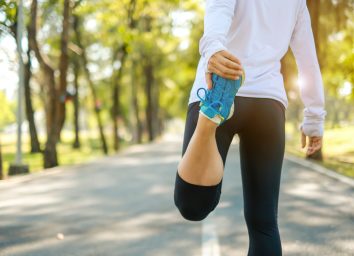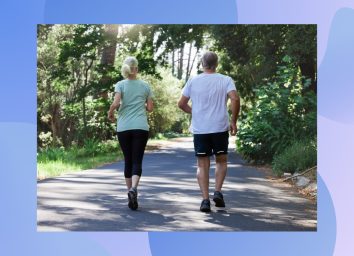The Worst Things Everyone Gets Wrong About Walking, Says Olympic Walker

All too often walkers get short shrift in the exercise world. Though taking brisk walks every day is well known to be an amazing way to burn tons of calories, increase your cardiovascular fitness, negate the ugly effects of sitting, and ultimately extend your life by upwards of 20 years, exercisers are far too quick to dismiss it as some sort of geriatric pastime for those who are incapable of running or performing more intense forms of exercise.
"I've seen people who walk on a treadmill in a gym get yawned at," Simon Gould, founder of Treadmill Run, a site devoted to all things treadmill, once explained to me. "The runners feel they should be walking outside and they're wasting the limited number of treadmills. They feel walking on a treadmill isn't proper exercise."
But newsflash: Walking is proper exercise. Don't take it from us—take it from someone who competes in racewalking on a global stage. Australian Jemima Montag won the gold medal at the 2018 Commonwealth Games and is favored to place well at this year's Summer Olympic Games in Tokyo, and she recently explained to the Australian site Body+Soul some of the most common misconceptions about walking that need to be unlearned immediately. Spoiler alert: We agree with her completely. So read on, and for more tips on becoming a better walker starting now, see here for The Secret Tricks for Walking for Exercise, According to Walking Specialists.
Walking Only Matters if You Can Meet or Exceed 10,000 Steps

As we've reported here at ETNT Mind+Body, the "10,000 steps" benchmark is actually rooted more in marketing than it is exact science. The truth is, you don't need to hit 10,000 steps to get a great workout. In fact, 4,500 is great, and a new study says that the benefits of walking may plateau at around 7,500 steps. That said, Montag says that the myth isn't good for walkers' mindsets.
"It can deflate people by underlining their inability to meet a daily goal, discourages us from exercising at all, waking may begin to feel like work, reducing its intrinsic pleasure," she explains. "Count [your steps] if it motivates you, but remember there's nothing special about 10,000 steps. Set the goal that's right for you. It may be more, less, or throwing out your tracker… Step counting isn't a complete picture of how active you are, as pedometers don't measure activities like cycling, yoga and swimming." And for at least one great way to increase the intensity of your walks, see Why This Crazy-Popular Walking Workout Totally Works, Say Experts.
Walking Isn't As Good As For You As Running

As trainers love to say: The best exercise you can do is the one that you actually do. "Running may be superior in terms of time-management and weight loss, but many people find walking more comfortable, enjoyable and thus more sustainable," says Montag. "Walking is associated with a lower risk of injury and, ultimately, going for an enjoyable walk every day is more productive than going for one hard run and being put off exercise for months." And for more reasons to walk, read about The One Major Side Effect of Going for a Single 1-Hour Walk, Says New Study.
Walking Is For People Who Can't Run

As hard as it is to believe for hardcore runners, not everyone prefers running. "The connotation here is that running is superior and if we aren't good/fit/strong enough to run then we must resort to the easier / second prize option," she says. "I like to run and walk every day and to be honest—I walk faster than I run, so it's certainly not the lazy option."
She goes on: "Unless you have an injury that prevents you from running, it's really about what you're in the mood for. Some days you may crave a sweaty, puffy run ending in that endorphin rush. Other days you might prefer a walk with your dog and a coffee. What I'd really like to get across is that everyone can run, and everyone can walk."
You Need to Walk With Weights to Make it a Worthwhile Workout

Adding ankle weights or holding hand weights may add resistance and help you burn more energy, but Montag stresses that "it's not essential that you walk with weights."
"You are still getting countless benefits from walking just as you are—from reducing your risk of cardiovascular disease to preventing and treating anxiety and depression and promoting positive mental health. It's much more important to establish a regular, enjoyable walking routine first and if you're up for an extra challenge, throw in those weights." And if you'd really like to burn fat while walking, see here for The 30-Second Trick to Losing More Weight While Walking.








